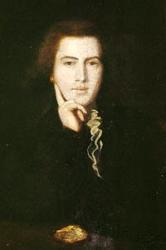1766 - 1799 Hymnal Number: d114 Author of "In the floods of tribulation" in A Selection of Hymns and Spiritual Songs Pearce, Samuel, son of a silversmith at Plymouth, was born in that town, July 20, 1766. Early in life he joined the Baptist Church in Plymouth, and, showing gifts for the ministry, was invited to preach. After a course of study at the Baptist College, Bristol, he became, in 1790, pastor of the Baptist congregation in Cannon Street, Birmingham. There his ministry was remarkably successful; but after a brief and bright course he died on Oct. 10, 1799. He was strongly disposed to foreign mission work, and was one of the founders of the Baptist Missionary Society, in 1792. His Memoirs, by A. Fuller, was published in 1800. Embodied in the Memoirs were eleven poetical pieces. In the 2nd edition, 1801, these pieces were grouped together at the end of the Memoirs. He is known to hymnology through the following hymns:—
1. Author of life, with grateful heart. Evening. This in the Methodist Free Church Sunday School Hymn Book, 1860, is the original with the omissions of st. iii.; that noted on p. 98, i. is a cento for "Morning." Both are from the Memoirs, 1800.
2. God of our lives, our morning song. Morning. From the Memoirs, 1800, into the Methodist Free Church Hymn Book, 1860, with the omission of st. ii.
3. In the floods of tribulation. In Affliction. His “Hymn in a Storm," in the Memoirs, 1800, in 4 st. of 10 1. In the 10th ed. of Rippon's Baptist Selections, 1800, it is given in another form of 8 st. of 6 1. This form has come down to modern hymnals.
4. Let ocean's waves tumultuous rise. Contentment. No in the Memoirs; but in Rippon's Selections, 1800, in 6 st. of 6 1.
5. Whene'er I look into Thy word. Sunday Morning. In the Memoirs, 1800, in 8 st. of 6 1. In the 27th ed. of Rippon's Selections., 1827, st. iv.-vii., slightly altered, were given as “Our precious Lord, on duty bent." [Rev. W. R. Stevenson, M.A.]
-- John Julian, Dictionary of Hymnology (1907)
Samuel Pearce


 My Starred Hymns
My Starred Hymns


